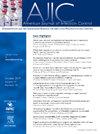饮酒是难辨梭状芽孢杆菌的危险因素。
IF 3.8
3区 医学
Q2 INFECTIOUS DISEASES
引用次数: 0
摘要
背景:艰难梭菌(C. diff)是一种令人关注的病原体。几个已知的危险因素,但没有这些危险因素的患者继续发展疾病。众所周知,酒精使用障碍(AUD)会像抗生素一样破坏肠道,这促使人们对AUD与艰难梭菌感染之间的关系进行评估。方法:在科罗拉多州卫生系统的五家医院进行了一项回顾性队列研究。包括在2022年和2023年在急诊科就诊或直接入院的18岁或以上的成年人。使用逻辑回归来研究AUD与C. diff之间的关系。结果:使用调整后的模型,AUD患者患C. diff的几率是无AUD患者的2.36倍。单独诊断为AUD的患者与未诊断为AUD的患者相比,C. diff的几率高1.88倍。患有澳元和主动戒断的人的几率比没有戒断的人高1.96。结论:AUD与C. diff风险增加之间存在显著关联,并且在主动停药的患者中风险增加。这些信息可用于指导早期干预措施。本文章由计算机程序翻译,如有差异,请以英文原文为准。
Alcohol use as a risk factor for Clostridioides difficile
Background
Clostridioides difficile (C. diff) is a pathogen of concern. Several risk factors are known, but patients without these risk factors continue to develop the disease. Alcohol use disorder (AUD) is known to disrupt the gut similar to antibiotics, which prompted this evaluation of the association between AUD and C. diff infection.
Methods
A retrospective cohort study was conducted within 5 hospitals in a health system in Colorado. Adults 18 years of age or older who were seen in the Emergency Department or directly admitted to the hospital in 2022 and 2023 were included. A logistic regression was used to investigate the association between AUD and C. diff.
Results
Using an adjusted model, patients with AUD had 2.36 times greater odds of C. diff compared with patients without AUD. The odds of C. diff were 1.88 times greater for those with AUD diagnoses alone compared with patients without AUD. The odds were 1.96 times greater for those with AUD and active withdrawal compared with those without.
Conclusions
There is a significant association between AUD and increased risk of C. diff, with that risk increasing in patients actively withdrawing. This information can be used to guide earlier interventions.
求助全文
通过发布文献求助,成功后即可免费获取论文全文。
去求助
来源期刊
CiteScore
7.40
自引率
4.10%
发文量
479
审稿时长
24 days
期刊介绍:
AJIC covers key topics and issues in infection control and epidemiology. Infection control professionals, including physicians, nurses, and epidemiologists, rely on AJIC for peer-reviewed articles covering clinical topics as well as original research. As the official publication of the Association for Professionals in Infection Control and Epidemiology (APIC)

 求助内容:
求助内容: 应助结果提醒方式:
应助结果提醒方式:


